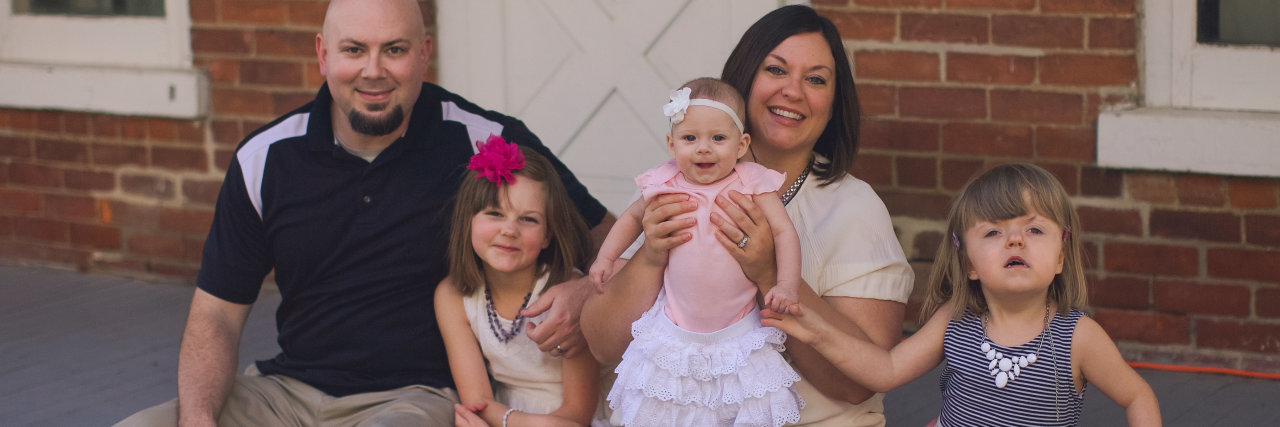For years, I’d seen those memes on social media that showcased a toothy child in a wheelchair or a baby post-op, usually with the caption, “Is nobody going to ‘like’ or ‘share?’ This is my [son/daughter/cousin/friend] with [disability]. Help spread the love!” I’d mindlessly scroll past, momentarily thinking how endearing it was for people to notice our children and exert some semblance of positive promotion.
But then I logged into Facebook, shortly before Thanksgiving a year ago, and my direct message inbox was flooded with images of Sarah as a baby that someone had lifted from our website and used — without my knowledge or permission — to promote their “share and like” campaigns. Shocked, I furiously checked these profiles, as well as the posts, and I was appalled to discover dozens of other photographs featuring nameless children with various disabilities — all for the same goal of reaching so many thousands of likes or shares.
A friend of mine who had been researching such matters informed me there are websites in which random people can pay to turn their numbers of “share and like” posts into profits. It seemed clear to me that they were exploiting my daughter and her rare disease for their own selfish gain. What infuriated me all the more were the countless number of strangers who fell prey to the game: they shared and liked, tens of thousands of times!
There were comments reflecting sympathy and pity, too. And I knew that likely all of these people were kindhearted and well-intentioned. But I felt sickened that anonymous names and faces could steal my daughter’s photo to elicit sympathy and earn money on the sly.
Then I read the well written article Stop Spreading Inspiration Porn About Disability here on The Mighty. Written from the perspective of a person living with a disability, it shed so much perspective on how truly harmful these memes have become. And as a mom, my heart was shattered. I had never dared to fathom that a person would conjure such a scam. My innocent heart had posted photos of Sarah without considering the potential scandal that could erupt online.
In the aftermath, people responded, “Well, that’s what you get when you post photos of your child online. Anything goes.” So there’s zero empathy from the perpetrators of the scams, and there’s little tolerance from family and friends, either.
My explanation is this: I love my daughter. She is not defined by Apert syndrome. Her identity is far deeper than the surgeries and therapies and appearances. I have moved from shamefully hiding her as an infant to proudly toting her everywhere we go and snapping pictures along the way. As parents of kids with disabilities, we shouldn’t have to hide our kids from the world out of fear. Nor should we have to take down dishonest people who don’t realize the damage they are causing from spreading their “inspiration porn” online.
People living with disabilities and their families do not want to be the object of pity or condescension. It is neither helpful nor kind to reduce any human being to a condition or disease or diagnosis. Labels help us find treatments and cures, yes, but we don’t use them to detract from the inherent dignity every person possesses and deserves.
I hope Sarah can grow up in a culture that sees beyond her facial differences, and that people will stop categorizing others are superior or inferior based on intellect, race, religion, disability or socioeconomic status. We all carry the potential for greatness, but to place a person on a pedestal of sympathy is just as degrading and dehumanizing as ignoring or ostracizing them.
Please, I implore you to stop the “like and share” campaigns by reporting any suspicious activity you notice online. Don’t share someone’s photo of their child without explicit permission from the parent or guardian. If you don’t know the person who is posting the meme, don’t like, comment, or share. It is possible for these “inspiration porn” posts to be removed, but it takes a mighty village to do so. With the help of our Apert family, we were able to get them all removed.
It’s better to “like and share” a person, not a photo. Like the person’s traits and talents; share the gift of that person’s wisdom and life experience. Don’t reduce humanity to a fleeting image that may have lasting and damaging implications online. It is better to #choosekind by living a life in which you welcome everyone with warmth and hospitality than assuming you are being kind by momentarily exhibiting pity upon a total stranger.
We want to hear your story. Become a Mighty contributor here.

